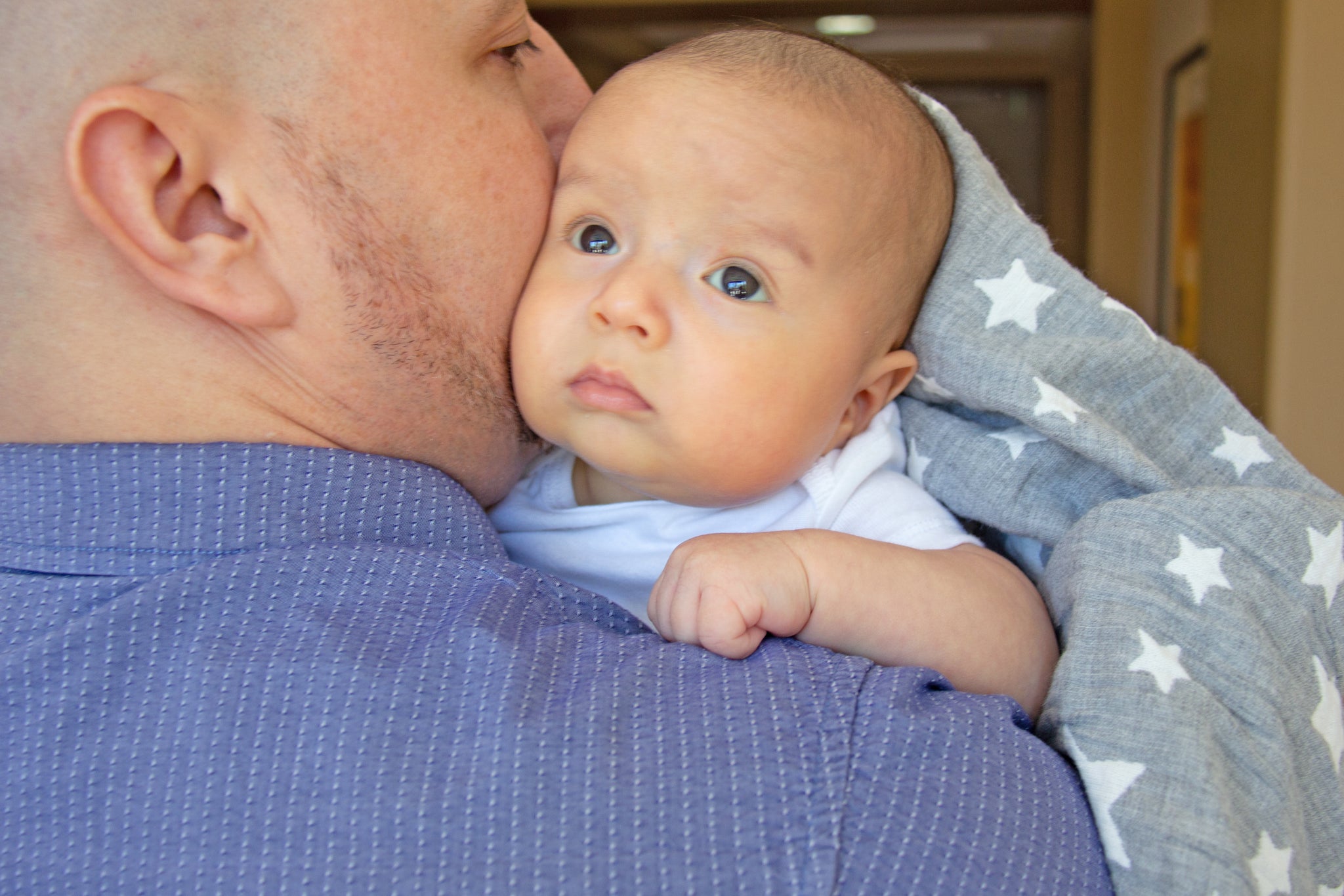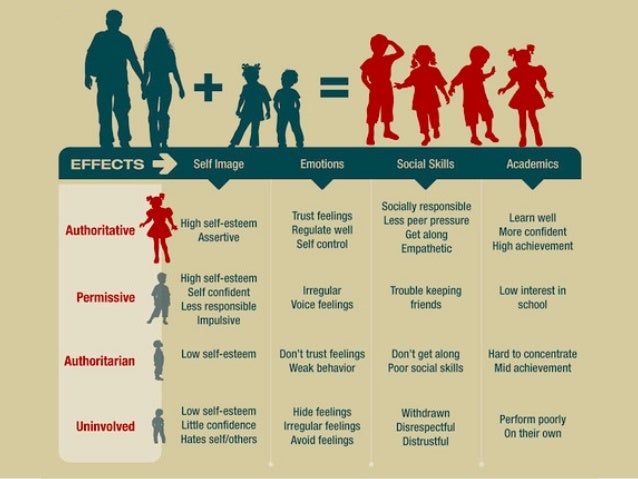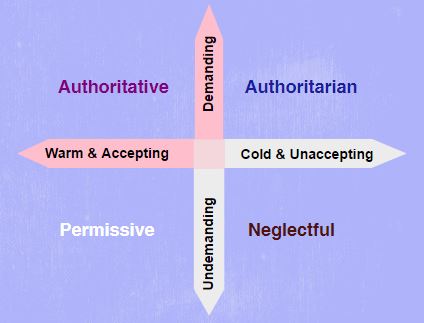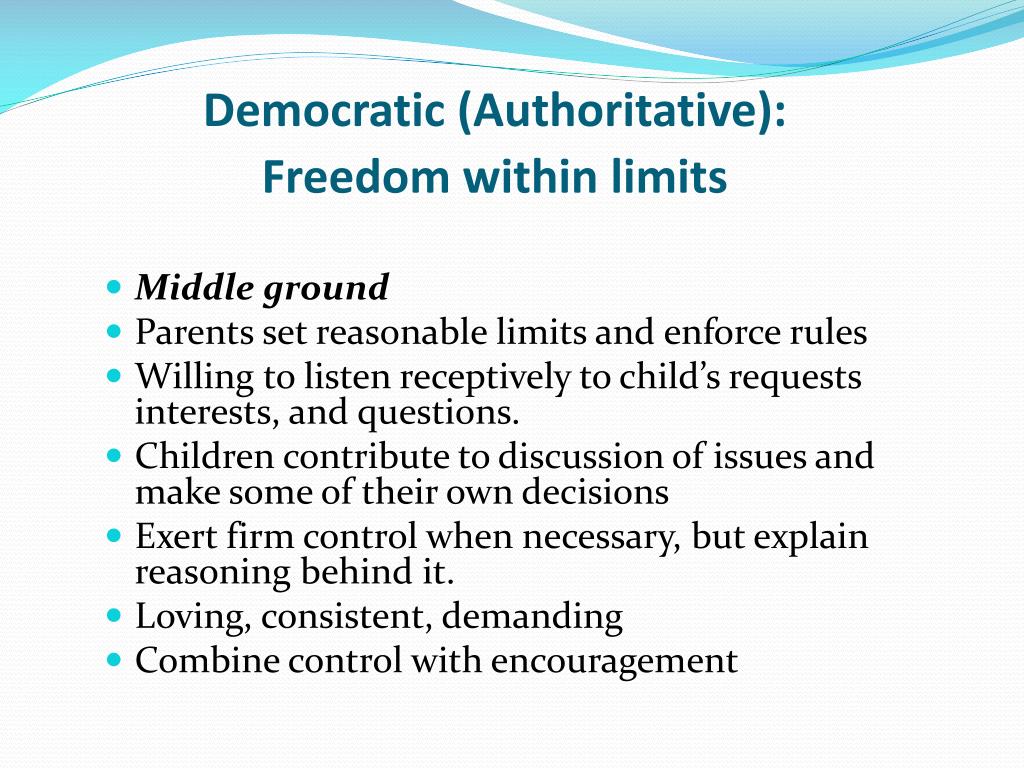A Parenting Style That Is Responsive And Sets Limits Is Known As Permissive Parenting Involves Setting Low Demands And Expectations On Children While Simultaneously Being A Responsive, Caring And Accepting Parent.
A Parenting Style That Is Responsive And Sets Limits Is Known As. Authoritative Parents Are Reasonable And Nurturing, And Set High, Clear Expectations.
SELAMAT MEMBACA!
Responsiveness refers to the degree parents are accepting and sensitive to their children's emotional and developmental needs.

For example, parents who are warm and responsive tend to have children who exhibit less.
A rational, democratic approach in which both parents' and children's rights are respected.
This style was known as «uninvolved» or «neglectful» parenting.

Permissive parents are not the same thing as neglectful parents.
Permissive parents are still loving and responsive to their children's needs.
A style of parenting is a set of strategies you use to raise your child.

They may not know what their child is doing and may not know.
Authoritative parents are reasonable and nurturing, and set high, clear expectations.
While it is easier for the family when both parents practice the same style of parenting, some research shows that if at least one parent is authoritative, that is better for the child than having two parents with the.

The parents make sure that the child knows if he is not doing things right at home or ignoring his in authoritarian parenting, demandingness is high and responsiveness is low, while.
Your parenting style can affect everything from how much your child weighs to how she feels about herself.
Authoritarian parents believe kids should follow the rules without exception.

This authoritative parenting style has been found to be associated with more positive adolescent developmental outcomes.
A parent with an authoritative style is demanding, but also is responsive.
Parents that have high expectations and set rules to guide their children's a child with a permissive parent may struggle with obesity since this style of parenting has a hard time limiting junk food consumption.

They attempt to control children's behavior by explaining rules, discussing, and reasoning.
They listen to a child's viewpoint but don't always accept it.
Permissive parenting is responsive but not demanding.

They propose that parenting style is best conceptualized as a context that moderates the influence of specific parenting practices on the child.
According to the psychologist baumrind, this style of parenting is known as permissive or indulgent parenting.
Permissive parenting involves setting low demands and expectations on children while simultaneously being a responsive, caring and accepting parent.

Positive parenting, also known as positive discipline, is a way of raising children that involves affection, empathy, communication, and mutual respect.
Offers a middle ground between the two approaches.
A parent who employs the positive approach sets limits, but reinforces them.
![What Is Authoritative Parenting? [With Examples]](https://www.parentingforbrain.com/wp-content/uploads/authoritative-parenting.jpeg)
In addition to reinforcing the six life skills your discipline should be teaching your child, setting limits is an important part of parenting.
Uninvolved parenting is characterized by undemanding and unresponsive parents.
Here's the effect neglectful parenting has on children.

So what does the uninvolved parenting style look like at a glance?
The authoritative parenting style is defined has parents setting high demands for their child.
While these parents are also very responsive to the child and their emotional needs, they also have no trouble setting clear boundaries, limits, guidelines, and expectations.

The combination of parental control and parental responsiveness is known as a 'parenting style'.
The authoritative parent is highly supportive and closely monitors and sets rules.
Authoritative parents are responsive to their children and willing to listen to questions.

They are neither overly strict nor overly the answer is that the right parenting style is the style that suits your child.
Every child is different and has a different set of needs, therefore, it is.
When parents don't set limits, here's what happens:
Kids need to know that their parents have a different role than they do, which includes keeping 9.
This refers to the degree in which the parent is responsive and supportive of the child's needs and demands.
Authoritarian parenting is an extremely strict form of parenting that expects a child to adhere to rules and regulations set out by the parents with little to.

This type of parenting style is not responsive.
Permissive parents are not strict, they do not set rules at all and if.
The rules for parenting are known to shift generation by generation.

Approaches vary based on several factors, ranging from how parents themselves were raised to the goals (santrock, 2001) authoritarian parents are also known as autocratic parents.
Authoritarian parenting is seen as a parenting style that is harsh.
Authoritative is considered the best the parents may set rules to try and keep their children from harm but they rarely ever enforce them and like permissive parents, authoritative parents are responsive, nurturing, and involved.

They propose that parenting style is best conceptualized as a context that moderates the influence of specific parenting practices on the child.
Another is that there is no empirical basis on which to draw conclusions about how the appropriateness of different parenting styles may vary depending on the.
3 X Seminggu Makan Ikan, Penyakit Kronis MinggatWajah Mulus Dengan Belimbing WuluhPD Hancur Gegara Bau Badan, Ini Solusinya!!Asam Lambung Naik?? Lakukan Ini!! Awas!! Nasi Yang Dipanaskan Ulang Bisa Jadi `Racun`Bahaya! Setelah Makan Jangan Langsung Minum, Ini Faktanya!!4 Manfaat Minum Jus Tomat Sebelum TidurTips Jitu Deteksi Madu Palsu (Bagian 2)Tekanan Darah Tinggi, Hajar Pakai Cincau HijauJam Piket Organ Tubuh (Hati)They propose that parenting style is best conceptualized as a context that moderates the influence of specific parenting practices on the child. A Parenting Style That Is Responsive And Sets Limits Is Known As. Another is that there is no empirical basis on which to draw conclusions about how the appropriateness of different parenting styles may vary depending on the.
Responsiveness refers to the degree parents are accepting and sensitive to their children's emotional and developmental needs.
For example, parents who are warm and responsive tend to have children who exhibit less.
A rational, democratic approach in which both parents' and children's rights are respected.
This style was known as «uninvolved» or «neglectful» parenting.

Permissive parents are not the same thing as neglectful parents.
Permissive parents are still loving and responsive to their children's needs.
A style of parenting is a set of strategies you use to raise your child.

They may not know what their child is doing and may not know.
Authoritative parents are reasonable and nurturing, and set high, clear expectations.
While it is easier for the family when both parents practice the same style of parenting, some research shows that if at least one parent is authoritative, that is better for the child than having two parents with the.

The parents make sure that the child knows if he is not doing things right at home or ignoring his in authoritarian parenting, demandingness is high and responsiveness is low, while.
Your parenting style can affect everything from how much your child weighs to how she feels about herself.
Authoritarian parents believe kids should follow the rules without exception.
This authoritative parenting style has been found to be associated with more positive adolescent developmental outcomes.
A parent with an authoritative style is demanding, but also is responsive.
Parents that have high expectations and set rules to guide their children's a child with a permissive parent may struggle with obesity since this style of parenting has a hard time limiting junk food consumption.

They attempt to control children's behavior by explaining rules, discussing, and reasoning.
They listen to a child's viewpoint but don't always accept it.
Permissive parenting is responsive but not demanding.
They propose that parenting style is best conceptualized as a context that moderates the influence of specific parenting practices on the child.
According to the psychologist baumrind, this style of parenting is known as permissive or indulgent parenting.
Permissive parenting involves setting low demands and expectations on children while simultaneously being a responsive, caring and accepting parent.

Positive parenting, also known as positive discipline, is a way of raising children that involves affection, empathy, communication, and mutual respect.
Offers a middle ground between the two approaches.
A parent who employs the positive approach sets limits, but reinforces them.

In addition to reinforcing the six life skills your discipline should be teaching your child, setting limits is an important part of parenting.
Uninvolved parenting is characterized by undemanding and unresponsive parents.
Here's the effect neglectful parenting has on children.

So what does the uninvolved parenting style look like at a glance?
The authoritative parenting style is defined has parents setting high demands for their child.
While these parents are also very responsive to the child and their emotional needs, they also have no trouble setting clear boundaries, limits, guidelines, and expectations.

The combination of parental control and parental responsiveness is known as a 'parenting style'.
The authoritative parent is highly supportive and closely monitors and sets rules.
Authoritative parents are responsive to their children and willing to listen to questions.

They are neither overly strict nor overly the answer is that the right parenting style is the style that suits your child.
Every child is different and has a different set of needs, therefore, it is.
When parents don't set limits, here's what happens:

Kids need to know that their parents have a different role than they do, which includes keeping 9.
This refers to the degree in which the parent is responsive and supportive of the child's needs and demands.
Authoritarian parenting is an extremely strict form of parenting that expects a child to adhere to rules and regulations set out by the parents with little to.
This type of parenting style is not responsive.
Permissive parents are not strict, they do not set rules at all and if.
The rules for parenting are known to shift generation by generation.

Approaches vary based on several factors, ranging from how parents themselves were raised to the goals (santrock, 2001) authoritarian parents are also known as autocratic parents.
Authoritarian parenting is seen as a parenting style that is harsh.
Authoritative is considered the best the parents may set rules to try and keep their children from harm but they rarely ever enforce them and like permissive parents, authoritative parents are responsive, nurturing, and involved.

They propose that parenting style is best conceptualized as a context that moderates the influence of specific parenting practices on the child.
Another is that there is no empirical basis on which to draw conclusions about how the appropriateness of different parenting styles may vary depending on the.
They propose that parenting style is best conceptualized as a context that moderates the influence of specific parenting practices on the child. A Parenting Style That Is Responsive And Sets Limits Is Known As. Another is that there is no empirical basis on which to draw conclusions about how the appropriateness of different parenting styles may vary depending on the.Resep Pancake Homemade Sangat Mudah Dan Ekonomis5 Cara Tepat Simpan TelurTernyata Inilah Makanan Indonesia Yang Tertulis Dalam PrasastiPete, Obat Alternatif DiabetesResep Selai Nanas HomemadeTernyata Makanan Ini Sangat Berbahaya Kalau Di Penjara7 Langkah Mudah Cara Buat Pizza Mini Tanpa Oven Untuk JualanSusu Penyebab Jerawat???Sejarah Gudeg JogyakartaResep Cumi Goreng Tepung Mantul
Komentar
Posting Komentar